Solar eclipse of March 7, 1932
| Solar eclipse of March 7, 1932 | |
|---|---|
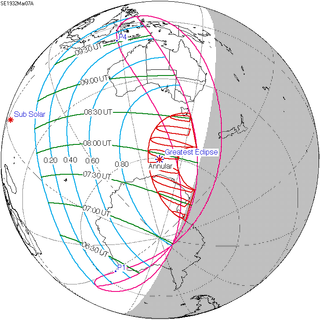 Map | |
| Type of eclipse | |
| Nature | Annular |
| Gamma | -0.9673 |
| Magnitude | 0.9277 |
| Maximum eclipse | |
| Duration | 319 sec (5 m 19 s) |
| Coordinates | 60°42′S 134°24′E / 60.7°S 134.4°E |
| Max. width of band | 1,083 km (673 mi) |
| Times (UTC) | |
| Greatest eclipse | 7:55:50 |
| References | |
| Saros | 119 (61 of 71) |
| Catalog # (SE5000) | 9356 |
An annular solar eclipse occurred on March 7, 1932. A solar eclipse occurs when the Moon passes between Earth and the Sun, thereby totally or partly obscuring the image of the Sun for a viewer on Earth. An annular solar eclipse occurs when the Moon's apparent diameter is smaller than the Sun's, blocking most of the Sun's light and causing the Sun to look like an annulus (ring). An annular eclipse appears as a partial eclipse over a region of the Earth thousands of kilometres wide.
Related eclipses[]
Solar eclipses 1931–1935[]
This eclipse is a member of a semester series. An eclipse in a semester series of solar eclipses repeats approximately every 177 days and 4 hours (a semester) at alternating nodes of the Moon's orbit.[1]
| Solar eclipse series sets from 1931–1935 | |||||
|---|---|---|---|---|---|
| Descending node | Ascending node | ||||
| 114 | September 12, 1931 Partial |
119 | March 7, 1932 Annular | ||
| 124 | August 31, 1932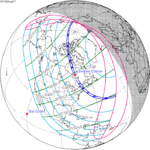 Total |
129 | February 24, 1933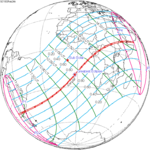 Annular | ||
| 134 | August 21, 1933 Annular |
139 | February 14, 1934 Total | ||
| 144 | August 10, 1934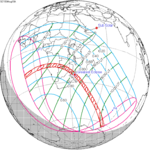 Annular |
149 | February 3, 1935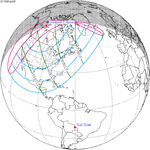 Partial | ||
| 154 | July 30, 1935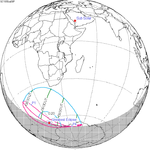 Partial | ||||
Saros 119[]
It is a part of Saros cycle 119, repeating every 18 years, 11 days, containing 71 events. The series started with partial solar eclipse on May 15, 850 AD. It contains total eclipses on August 9, 994 AD and August 20, 1012 with a hybrid eclipse on August 31, 1030. It has annular eclipses from September 10, 1048 through March 18, 1950. The series ends at member 71 as a partial eclipse on June 24, 2112. The longest duration of totality was only 32 seconds on August 20, 1012. The longest duration of annularity was 7 minutes, 37 seconds on September 1, 1625. The longest duration of hybridity was only 18 seconds on August 31, 1030.
| Series members 54–70 occur between 1801 and 2100: | ||
|---|---|---|
| 54 | 55 | 56 |
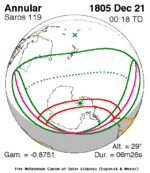 December 21, 1805 |
 January 1, 1824 |
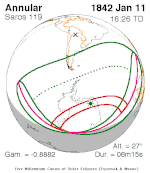 January 11, 1842 |
| 57 | 58 | 59 |
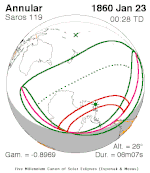 January 23, 1860 |
 February 2, 1878 |
February 13, 1896 |
| 60 | 61 | 62 |
 February 25, 1914 |
 March 7, 1932 |
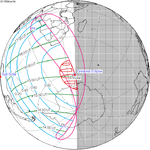 March 18, 1950 |
| 63 | 64 | 65 |
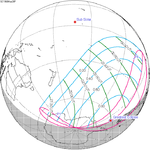 March 28, 1968 |
 April 9, 1986 |
 April 19, 2004 |
| 66 | 67 | 68 |
 April 30, 2022 |
 May 11, 2040 |
 May 22, 2058 |
| 69 | 70 | |
 June 1, 2076 |
 June 13, 2094 | |
Metonic series[]
The metonic series repeats eclipses every 19 years (6939.69 days), lasting about 5 cycles. Eclipses occur in nearly the same calendar date. In addition, the octon subseries repeats 1/5 of that or every 3.8 years (1387.94 days). All eclipses in this table occur at the Moon's ascending node.
| 22 eclipse events between December 24, 1916 and July 31, 2000 | ||||
|---|---|---|---|---|
| December 24–25 | October 12–13 | July 31-Aug 1 | May 18–20 | March 7–8 |
| 91 | 93 | 95 | 97 | 99 |
| December 23, 1878 | October 12, 1882 | July 31, 1886 | May 18, 1890 | March 7, 1894 |
| 101 | 103 | 105 | 107 | 109 |
| December 23, 1897 | October 12, 1901 | August 1, 1905 | May 19, 1909 | March 8, 1913 |
| 111 | 113 | 115 | 117 | 119 |
 December 24, 1916 |
October 12, 1920 |  July 31, 1924 |
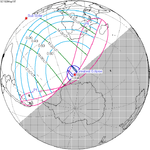 May 19, 1928 |
 March 7, 1932 |
| 121 | 123 | 125 | 127 | 129 |
 December 25, 1935 |
 October 12, 1939 |
 August 1, 1943 |
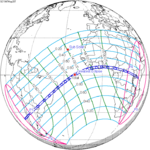 May 20, 1947 |
 March 7, 1951 |
| 131 | 133 | 135 | 137 | 139 |
 December 25, 1954 |
 October 12, 1958 |
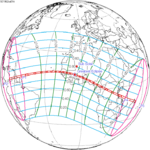 July 31, 1962 |
 May 20, 1966 |
 March 7, 1970 |
| 141 | 143 | 145 | 147 | 149 |
 December 24, 1973 |
 October 12, 1977 |
 July 31, 1981 |
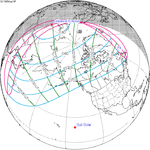 May 19, 1985 |
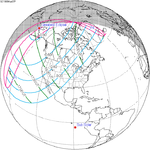 March 7, 1989 |
| 151 | 153 | 155 | 157 | 159 |
 December 24, 1992 |
 October 12, 1996 |
 July 31, 2000 |
May 19, 2004 | March 7, 2008 |
| 161 | 163 | 165 | 167 | 169 |
| December 24, 2011 | October 13, 2015 | August 1, 2019 | May 19, 2023 | March 8, 2027 |
Notes[]
- ^ van Gent, R.H. "Solar- and Lunar-Eclipse Predictions from Antiquity to the Present". A Catalogue of Eclipse Cycles. Utrecht University. Retrieved 6 October 2018.
References[]
- Earth visibility chart and eclipse statistics Eclipse Predictions by Fred Espenak, NASA/GSFC
- Annular solar eclipses
- 20th-century solar eclipses
- 1932 in science
- March 1932 events
- Solar eclipse stubs



